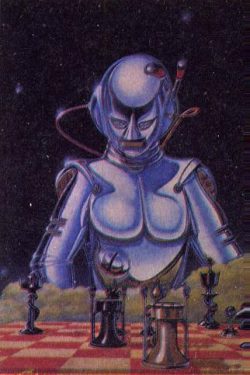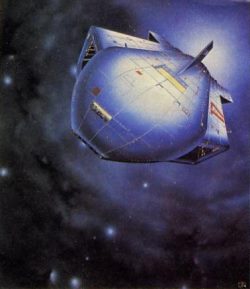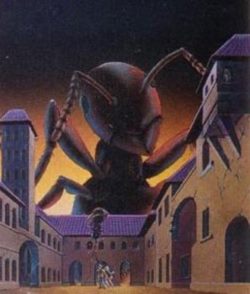
“CLIVE” AWARDS — Limited edition of prints 1984

“CLIVE” AWARDS — Limited edition of prints 1984
We interviewed DAVID ROWE while he was still trembling a little, fresh from the experience of being interviewed on TV about his latest work — the inlay artwork for the Soft Aid games compilation tape which has been produced to raise money for the Ethiopian appeal. ‘I’m the man who turns to Jelly on the Telly,’ he stated — and his throat was still a bit dry!

Chessplayer — Quicksilva
David Rowe began his association with the software industry in the Autumn of 1982 when a friend of his, Nick Lambert, was setting up Quicksilva. Called in to do the cover artwork for The Chess Player, David rapidly became a mainstay of Quicksilva’s Art Department and while remaining a freelance, has so far done over 50 cover illustrations for Quicksilva.
But that is by no means all!

Computer & Video Games — EMAP
Between graduating from Brighton Polytechnic in 1975 and becoming involved in illustrating cover inlays, David worked as a ‘jobbing artist’ applying his skills as a draughtsman to the requirements of his clients — and apart from illustrating catalogues and brochures on commission, he spent a while doing acrylic portraits of people’s pets. ‘Grinding hard work,’ is how he describes this phase of his career. And while he wind-cycled round the country lanes of Hampshire, partly propelled by the breeze catching the A1 portfolio he carried on his back, he set up deals with pubs by which he drew the boozer and sold a set of limited edition prints to the landlord, who then offered them for sale to his regulars.
David was in at the start as a software illustrator and he has painted the pictures which form the basis of a large number of book covers for firms such as Addison Wesley, Interface and Melbourne House — all for their computer-related titles as well as producing covers for magazines such as Acorn User and C&VG.

Fred — Quicksilva. Rod Cousens as Fred
‘The computer industry provides such a terrific medium to work in, and there’s a great deal of allowance for personal expression — and the games almost demand an illustrator to incorporate a bit of fun and whimsy in his work. A commission from an advertising agency to, say, do an airbrush painting of a fridge can be soul-destroying — but you have to be professional,’ he told us.
He has been involved in producing computer graphics; using a sprite designer written by John Hollis he did the animation and graphics for Aquaplane. But he has no plans to get involved more deeply in this field — apart from a bit of hush-hush work currently underway for a top secret new Quicksilva project, his interest lies mainly in painting. His illustration for Sandy White’s program Ant Attack went down well with the program’s author, who is a sculptor as well as a programmer oddly enough. The first time David and Sandy met was at the launch of the game — but they got together as artists for the Zombie Zombie cover, by which hangs a tale...

Ant Attack — Quicksilva
Rather than draw an ant from memory, David went out and bought a second-hand microscope for £100, found an ant and did the drawing from life. Peering down a microscope with one eye and using the other one to do a drawing of what was on the slide was how he got involved with art! After studying Zoology, Botany and English at A level, he decided to ‘become a hippy’ for a couple of years (in the late sixties) before starting art school.
His current main project? Acting as co-ordinator to a team putting together a book which will use a large number of software artists’ work — along the lines of the album cover books published by Paper Tiger (for whom David worked in the seventies). ‘It seemed the logical thing to do,’ he explained, ’there’s an international market, and it can be sold everywhere that computers are sold, not just in bookshops.’
Not bad for a self-confessed ex-hippy, but has he sold out with his wife, two-point-four children, Ford Cortina and semi-detached home we asked. ’Wife, two children — and the dog’s point-four I suppose; I’ve got a mortgage but it’s a Ford Sierra,’ he chuckled. ‘I work from home, so it’s a compromise, but largely on my terms — I’m not suffering from the daily grind.’
Lucky man.